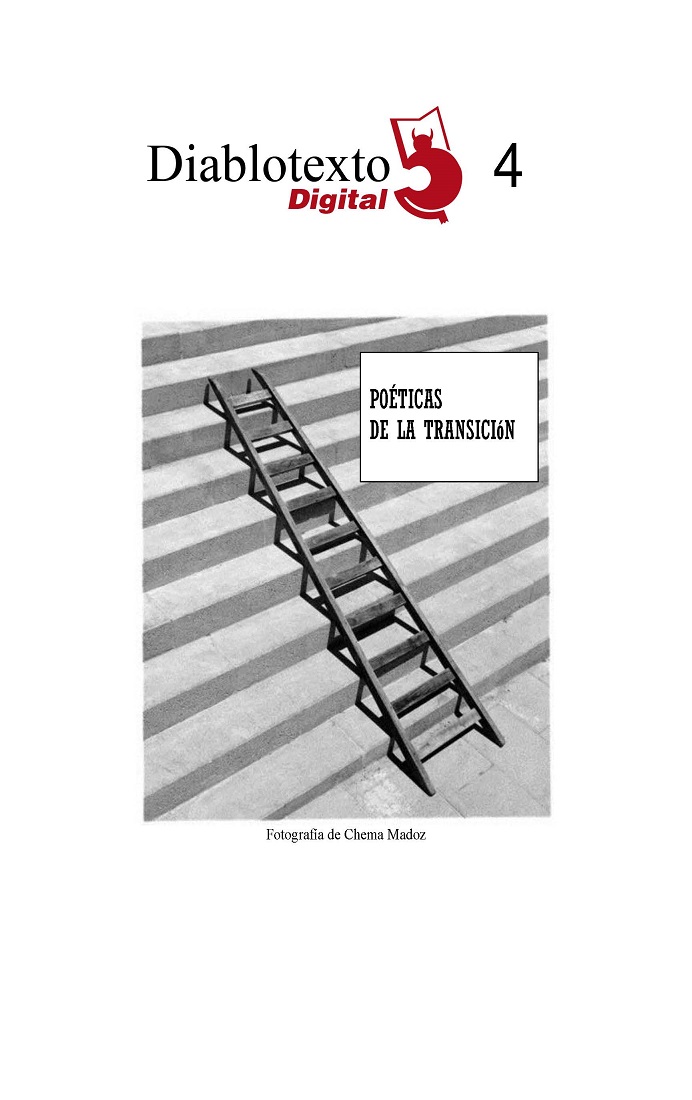Linguistic transgression as poetic in the work of Rafael Ballesteros (1969-1986)
DOI:
https://doi.org/10.7203/diablotexto.4.15333Keywords:
Rafael Ballesteros, Spanish political transition, Poetic transgression Abstract
Abstract
Rafael Ballesteros (Málaga, 1938) has developed one of the most original and personal poetics of the Transition, in the works he published in those years, especifically in Jacinto, a secular, sacrilegious and iconoclastic “auto sacramental”. The conceptual and semiotic transgression of his poetry was based on the creation of his own poetic language. Its language is born of transgression of the standard system of the language and the adoption of a dialogical perspective. These presuppositions supposed the rupture with the monological patterns of the discourse of power that dominated the Spanish society in the last half century.
 Downloads
Downloads
 References
References
Alcalá Malavé, Ángel (2016). «Rafael Ballesteros rompe el lenguaje para hallar sentido a la realidad». Poéticas y pronunciamientos. Málaga: El Toro Celeste, 107-147.
Balcells, José María (2016). «Rafael Ballesteros y los vislumbres del velo». Lectura y signo. 11, 2, 2016, 9-25.
Balcells, José María (1995). «Introducción a la poesía de Rafael Ballesteros». Rafael Ballesteros. Poesía (1969-l989). Málaga: Ayuntamiento de Málaga.
Ballesteros, Rafael (1986). «Notas para una poética», Los cuadernos del Norte. Monográfico 3 El estado de las poesías, pp. 24-25.
Barrero, Óscar (1996). «La rebelión de las palabras en la poesía de Rafael Ballesteros». Estudios humanísticos, Universidad de León. 18, 57-69.
Lanz, Juan José (2015). «La poesía de Rafael Ballesteros: 1990-2010», Ballesteros, Rafael. Poesía 1990-2010. Málaga: El toro celeste, 9-98.
López-Pasarín Basabe, Alfredo (2016). Teoría y práctica del análisis de textos poéticos. Madrid: Devenir.
Martínez Fernández, José Enrique (1996). «Rupturas y fragmentarismos en la poesía de Rafael Ballesteros». El fragmentarismo poético contemporáneo. León: Universidad de León, 111-120.
Martínez Sarrión, Antonio (1984). «Rafael Ballesteros. Jacinto». Los Cuadernos del Norte. 28, 95-96.
Morales Lomas, Francisco; Torés García, Alberto (2015). Poeta del 60 (Una promoción entre paréntesis). Estudio y antología. Málaga: El Toro Celeste, 109-122.
Moreno Ayora, Antonio (2015). «Rafael Ballesteros: tiempo, indagación y lenguaje». Epos. XXXI, 533-540.
Romojaro, Rosa (2004). «Trayectoria poética de Rafael Ballesteros». Lo escrito y lo leído. Madrid: Anthropos, 121-134.
Torés, Alberto (2002) Poesía Española (1975-2001). Málaga: Aljaima.
Torres, Francisco Javier (2009). «Neovanguardia en Málaga. Las poéticas de los años 60 y 70». Poéticas capitales. Benalmádena: E.D.A. Libros, 55-133.
Downloads
Published
How to Cite
-
Abstract365
-
PDF (Español)197
Issue
Section
License
Licencia de reconocimiento de Creative Commons “Reconocimiento - No Comercia l- Sin Obra Derivada
Authors who publish with this journal agree to the following items:
The authors will keep their copyright and guarantee the journal the right of first publication of their work, which will be simultaneously subject to the Creative Commons license that allows third parties to share the work indicating its author and its first publication in the journal. The authors may adopt other non-exclusive license agreements to distribute the version of the published work (e.g., depositing it in an institutional telematic file or publishing it in a monographic volume), with an acknowledgment of its initial publication in this journal. The authors are allowed and encouraged to disseminate their work through the Internet (e.g., in institutional telematic archives or on their website) before and during the submission process, which can produce interesting exchanges and increase citations of the published work. (See Effect of Open Access)




